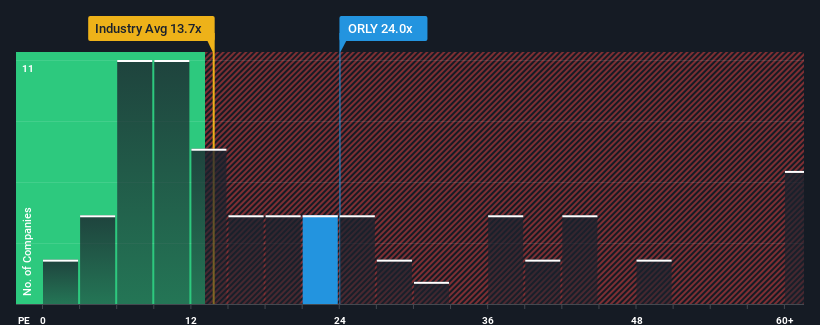- United States
- /
- Specialty Stores
- /
- NasdaqGS:ORLY
O'Reilly Automotive, Inc.'s (NASDAQ:ORLY) Price Is Out Of Tune With Earnings

O'Reilly Automotive, Inc.'s (NASDAQ:ORLY) price-to-earnings (or "P/E") ratio of 24x might make it look like a sell right now compared to the market in the United States, where around half of the companies have P/E ratios below 16x and even P/E's below 9x are quite common. Nonetheless, we'd need to dig a little deeper to determine if there is a rational basis for the elevated P/E.
With its earnings growth in positive territory compared to the declining earnings of most other companies, O'Reilly Automotive has been doing quite well of late. The P/E is probably high because investors think the company will continue to navigate the broader market headwinds better than most. You'd really hope so, otherwise you're paying a pretty hefty price for no particular reason.
Check out our latest analysis for O'Reilly Automotive

Is There Enough Growth For O'Reilly Automotive?
The only time you'd be truly comfortable seeing a P/E as high as O'Reilly Automotive's is when the company's growth is on track to outshine the market.
Retrospectively, the last year delivered a decent 15% gain to the company's bottom line. Pleasingly, EPS has also lifted 74% in aggregate from three years ago, partly thanks to the last 12 months of growth. So we can start by confirming that the company has done a great job of growing earnings over that time.
Looking ahead now, EPS is anticipated to climb by 10% each year during the coming three years according to the analysts following the company. Meanwhile, the rest of the market is forecast to expand by 13% per annum, which is noticeably more attractive.
With this information, we find it concerning that O'Reilly Automotive is trading at a P/E higher than the market. Apparently many investors in the company are way more bullish than analysts indicate and aren't willing to let go of their stock at any price. Only the boldest would assume these prices are sustainable as this level of earnings growth is likely to weigh heavily on the share price eventually.
What We Can Learn From O'Reilly Automotive's P/E?
We'd say the price-to-earnings ratio's power isn't primarily as a valuation instrument but rather to gauge current investor sentiment and future expectations.
Our examination of O'Reilly Automotive's analyst forecasts revealed that its inferior earnings outlook isn't impacting its high P/E anywhere near as much as we would have predicted. When we see a weak earnings outlook with slower than market growth, we suspect the share price is at risk of declining, sending the high P/E lower. This places shareholders' investments at significant risk and potential investors in danger of paying an excessive premium.
There are also other vital risk factors to consider and we've discovered 3 warning signs for O'Reilly Automotive (1 is concerning!) that you should be aware of before investing here.
You might be able to find a better investment than O'Reilly Automotive. If you want a selection of possible candidates, check out this free list of interesting companies that trade on a low P/E (but have proven they can grow earnings).
New: AI Stock Screener & Alerts
Our new AI Stock Screener scans the market every day to uncover opportunities.
• Dividend Powerhouses (3%+ Yield)
• Undervalued Small Caps with Insider Buying
• High growth Tech and AI Companies
Or build your own from over 50 metrics.
Have feedback on this article? Concerned about the content? Get in touch with us directly. Alternatively, email editorial-team (at) simplywallst.com.
This article by Simply Wall St is general in nature. We provide commentary based on historical data and analyst forecasts only using an unbiased methodology and our articles are not intended to be financial advice. It does not constitute a recommendation to buy or sell any stock, and does not take account of your objectives, or your financial situation. We aim to bring you long-term focused analysis driven by fundamental data. Note that our analysis may not factor in the latest price-sensitive company announcements or qualitative material. Simply Wall St has no position in any stocks mentioned.
About NasdaqGS:ORLY
O'Reilly Automotive
Operates as a retailer and supplier of automotive aftermarket parts, tools, supplies, equipment, and accessories in the United States, Puerto Rico, and Mexico.
Acceptable track record low.


